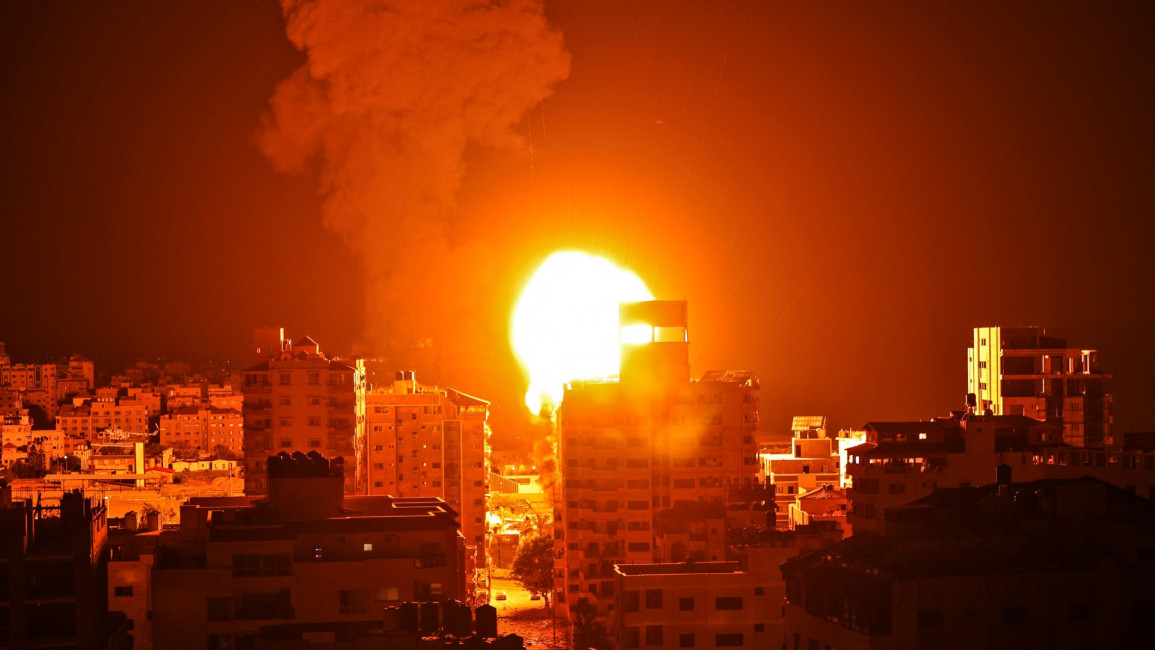Gaza pummelled by fresh Israeli strikes, more than 200 dead in a week
Overnight Sunday to Monday, Israel launched dozens of strikes in the space of a few minutes across the crowded coastal Palestinian enclave controlled by Hamas, according to AFP journalists at the scene.
The strikes caused widespread power cuts and damaged hundreds of buildings, local authorities said. No casualties were immediately reported.
West Gaza resident Mad Abed Rabbo, 39, expressed "horror and fear" at the intensity of the onslaught.
"There have never been strikes of this magnitude," he said.
In a statement just before 2:00 am (2300 GMT Sunday), the Israeli army said its fighter jets were "striking terror targets in the Gaza Strip".
Gazan Mani Qazaat said Israeli Prime Minister Benjamin Netanyahu "should realise we're civilians, not fighters".
"I felt like I was dying."
The renewed strikes come a day after 42 Palestinians in Gaza - including at least eight children and two doctors, according to the health ministry - were killed in the worst daily death toll in the enclave since the bombardments began.
In total, 197 Palestinians have been killed in Gaza, including at least 58 children, and more than 1,200 wounded since Israel launched its air campaign against Hamas on May 10 after the group fired rockets. The heaviest exchange of fire in years was sparked by unrest in Jerusalem.
In Israel, 10 people, including one child, have been killed and 282 wounded by rocket fire launched by armed groups in Gaza.
'Legitimate'
Israel's army said about 3,000 rockets had been fired since last Monday from Gaza towards Israel - the highest rate ever recorded - but added the Iron Dome anti-missile system had intercepted over 1,000.
Netanyahu said in a televised address Sunday that Israel's "campaign against the terrorist organisations is continuing with full force" and would "take time" to finish.
Read more: How are Saudi and Emirati media covering Israeli violence against Palestinians?
The Israeli army said it had targeted the infrastructure of Hamas and armed group Islamic Jihad, including a vast tunnel system, weapons factories and storage sites.
Israeli air strikes also hit the home of Yahya Sinwar, head of Hamas's political wing in Gaza, the army said, releasing footage of plumes of smoke and intense damage, but without saying if he was killed.
Balls of flame and a cloud of debris shot into the sky Saturday afternoon as Israel's air force flattened a building housing Al Jazeera and AP news agency, after giving journalists an hour to evacuate.
Netanyahu on Sunday said the building also hosted a Palestinian "terrorist" intelligence office.
"It is a perfectly legitimate target," he said.
Inter-communal clashes
The violence between Hamas and Israel is the worst since 2014, when Israel launched a military operation on the Gaza Strip with the stated aim of ending rocket fire and destroying tunnels used for smuggling.
The war left 2,251 dead on the Palestinian side, mostly civilians, and 74 on the Israeli side, mostly soldiers.
Opening the first session of the UN Security Council on the renewed violence on Sunday, Secretary-General Antonio Guterres called the fighting "utterly appalling".
"It must stop immediately," he said.
But the UN talks, already delayed by Israel's ally the United States, resulted in little action, with Washington opposing a resolution.
President Joe Biden's administration says it is working behind the scenes and that a Security Council statement could backfire.
Israel is also trying to contain inter-communal violence between Jews and Arab-Israelis, as well as deadly clashes in the occupied West Bank, where 19 Palestinians have been killed since Monday, according to a toll from Palestinian authorities.
Major clashes broke out at the Al-Aqsa mosque compound - one of Islam's holiest sites - on May 7 following a crackdown against protests over planned expulsions of Palestinians in the Sheikh Jarrah neighbourhood of Israeli-annexed east Jerusalem.
Sheikh Jarrah has been at the heart of the flareup, seeing weeks of clashes between Palestinians and Israeli security forces.
On Sunday, a car-ramming attack in Sheikh Jarrah wounded seven police officers, police said, adding that the attacker had been killed.
Police also said "a number of suspects" had been arrested during clashes in another east Jerusalem neighbourhood overnight Sunday to Monday.
Guterres warned the fighting could have far-reaching consequences if not stopped immediately.
"It has the potential to unleash an uncontainable security and humanitarian crisis and to further foster extremism, not only in the occupied Palestinian territory and Israel, but in the region as a whole."



